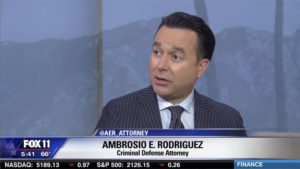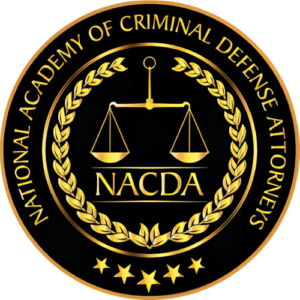Los Angeles Juvenile Crimes Attorney

When a juvenile is accused of criminal activity, their future hangs in the balance. Unlike adult crimes, juvenile cases have unique legal challenges requiring advanced knowledge and a strategic approach. At The Rodriguez Law Group, our experienced Los Angeles juvenile crimes lawyers defend juveniles and protect their rights throughout the legal process.
Our team, led by former prosecutors, understands the pivotal role of a strong defense in minimizing long-term consequences for your child. From misdemeanor offenses to serious felonies, we provide compassionate yet aggressive legal representation to ensure your child has the best chance for a fresh start.
Quick Navigation Menu
- Juvenile Crimes 101
- What is Juvenile Delinquency Court?
- Why Juvenile Cases Are Complex
- The Juvenile vs. Adult Court System
- When Juveniles Are Tried as Adults
- Potential Consequences of a Juvenile Criminal Conviction
- How We Can Limit Consequences
- Common Types of Juvenile Crimes in Los Angeles
- The Importance of Skilled Legal Representation
- Why Choose the Rodriguez Law Group?
- Contact The Rodriguez Law Group Today for Juvenile Defense
Juvenile Crimes 101

Juvenile crimes refer to offenses committed by individuals under the age of 18. These cases are handled in a separate court system designed to rehabilitate rather than punish young offenders. However, the process is far from lenient, and the consequences can still be severe if not managed properly.
Common juvenile crimes include theft, vandalism, assault, drug possession, DUI, and even serious felonies like robbery or homicide. While the court generally prioritizes rehabilitation, certain cases may be escalated to adult court depending on the severity of the charges, the minor’s age, and their history.
Juvenile crime cases require skilled legal counsel who can argue for the child’s protection and rehabilitation rather than punitive measures. This often involves presenting mitigating factors, such as the child’s background, lack of intent, or other circumstances influencing their behavior.
What is Juvenile Delinquency Court?

Juvenile delinquency court is a specialized branch of the legal system that handles cases involving minors (typically under 18) who are accused of violating criminal laws.
Unlike adult courts, juvenile courts focus on rehabilitation rather than punishment to guide youth to a responsible path.
The process in juvenile court includes several stages, such as intake, detention, adjudication, disposition, and aftercare, emphasizing privacy and the minor’s best interest.
Outcomes can vary widely, from warnings or probation to placement in a juvenile detention center, depending on the severity of the offense and the minor’s history.
The court may also involve parents or guardians in the resolution process and can order various forms of therapy, community service, or educational programs as part of its rehabilitative efforts.
Juvenile courts operate under the principle that young offenders have the potential for change and should be provided opportunities for reform.
601 and 602 Proceedings in Juvenile Criminal Justice System
Two types of petitions may be filed to request court involvement in which case a judge will decide if the petition is true.
The probation department files a 601 petition for “status offenders.” These can include truancy, running away from home, or breaking curfew.
The district Attorney’s Office files a 602 petition stating that the juvenile committed an offense that would be a crime if committed by an adult.
The 602 proceeding comes from the California Welfare and Institutions Code, Section 602. This law gives the juvenile court jurisdiction over delinquency cases involving minors between 12 and 17.
Why Juvenile Cases Are Complex
Juvenile cases are inherently different from adult criminal cases for several reasons:
- Developmental stage: Juveniles may lack the maturity to fully understand their actions’ consequences.
- System goals: Where adult courts focus on penalties, juvenile courts aim to rehabilitate.
- Hybrid systems: Juveniles could face trial in adult court depending on the charge.
A strong legal strategy must consider these factors, ensuring that the process emphasizes the child’s potential for change and growth.
The Juvenile vs. Adult Court System

The juvenile justice system in California operates differently from its adult counterpart. This distinction reflects the understanding that children and teenagers are still developing and deserve a second chance to turn their lives around.
Key differences
- Focus on rehabilitation
Juvenile courts prioritize rehabilitation over punishment. Sentences often involve counseling, educational programs, or community service rather than incarceration. - Private proceedings
Unlike adult court, juvenile hearings are closed to the public to protect the minor’s identity and avoid long-term harm to their reputation. - Sentencing goals
Sentences in juvenile court aim to reform behavior rather than impose punitive measures. However, for grave offenses, juveniles may still face time in juvenile detention facilities or be transferred to adult court. - Age-specific rules
California law limits certain harsh penalties for minors, such as life sentences without parole, reflecting the belief in their capacity for change.
When Juveniles Are Tried as Adults
Not all juvenile cases remain in juvenile court. Minors aged 16 and older may face trial as adults in certain serious felony cases, including murder or sexual assault.
The prosecution may file a motion for transfer to adult court if the crime is particularly severe or premeditated, or if the minor has a history of previous offenses.
An experienced juvenile defense attorney plays a crucial role in preventing this transfer, leveraging psychological evaluations, expert testimony, and a well-supported argument for rehabilitation to keep the case in juvenile court.
Potential Consequences of a Juvenile Criminal Conviction

While the juvenile system prioritizes rehabilitation, the consequences of a conviction can still be life-altering. A strong defense can mean the difference between a second chance and long-lasting setbacks.
Short-term effects
- Court-ordered probation
- Mandatory counseling or therapy
- Community service requirements
- Juvenile detention or group home placement
Long-term effects
Even if proceedings occur in juvenile court, convictions may still leave lasting marks on educational and professional opportunities. Under certain circumstances, juvenile records can later surface, potentially affecting:
- College admissions
Certain schools may inquire about juvenile cases as part of their admissions process. - Employment opportunities
Juvenile records might not be sealed and could appear during rigorous background checks. - Freedom & travel restrictions
Certain convictions may limit career options, international travel, or even enlistment in the military.
Fortunately, juvenile records in California may be eligible for sealing or expungement under specific conditions, allowing the minor to enter adulthood without a criminal history weighing them down.
How We Can Limit Consequences
At The Rodriguez Law Group, we work to minimize the potential impact of juvenile cases. Whether arguing for less severe penalties, working toward dismissal, or helping with early record sealing, our process is designed to protect your child’s future.
Common Types of Juvenile Crimes in Los Angeles

Juvenile crimes range from relatively minor infractions to severe offenses. Understanding the type of charge is crucial for crafting an effective defense.
Minor offenses
Some cases involve behavior better described as youthful indiscretions rather than crimes. These include:
- Underage drinking
Often charged as an infraction or misdemeanor. - Petty theft
Shoplifting or stealing low-value items. - Vandalism
Defacing property with graffiti or other damage.
While these offenses may seem minor, they still carry serious repercussions if not managed appropriately.
Serious crimes
More grave charges can lead to harsher outcomes and potentially an adult court transfer:
- Assault and battery
Physical altercations involving injury. - Robbery
Taking property through force or intimidation. - Drug offenses
Possession, sale, or distribution of controlled substances. - Sex crimes
Cases involving allegations of sexual misconduct.
At The Rodriguez Law Group, we have extensive experience defending juveniles against all charges, including high-stakes cases like drug crimes and felonies.
The Importance of Skilled Legal Representation

When juvenile charges arise, parents and families often feel overwhelmed, fearful, and uncertain about what comes next. The stakes are high, as a single misstep in the legal process could jeopardize your child’s future.
At The Rodriguez Law Group, we treat every juvenile case with the care and urgency it deserves.
Having knowledgeable legal counsel can make all the difference:
Protecting Your Child’s Rights
The legal system may sometimes attempt to cut corners in juvenile cases, leading to violations of fundamental rights. Our attorneys ensure proper procedures are followed, from evidence collection to courtroom hearings, safeguarding your child’s legal protections.
Negotiating Favorable Outcomes
The juvenile system allows for a range of creative sentencing options that emphasize rehabilitation over punishment. Our attorneys negotiate terms such as diversion programs, ensuring your child has access to constructive paths forward.
Mitigating Serious Penalties
For serious felonies, The Rodriguez Law Group works diligently to reduce charges, keep the case in juvenile court, and limit the lifelong impact of a conviction.
Early Record Sealing
We assist in sealing your child’s records after proceedings conclude, ensuring they can move forward without the constant shadow of past mistakes.
Our legal team carries a deep understanding of how the system operates—from both the defense and prosecution side—giving us a distinct advantage in building your child’s case.
Why Choose the Rodriguez Law Group?
The Rodriguez Law Group stands apart for its dedication to client-focused, results-driven legal representation. For juveniles facing charges in Los Angeles, our firm provides a powerful combination of experience, resourcefulness, and compassion.
Former prosecutors on your side
Our attorneys, including founding attorney Ambrosio Rodriguez and managing partner Sommer Salam, bring decades of experience as former prosecutors. We know how the opposing side thinks, which allows us to anticipate their strategies and counter them effectively.
Proven approach to juvenile defense
We’ve handled countless cases involving minors and know what it takes to achieve positive outcomes. This includes advocating for solutions that prioritize education, counseling, and second chances.
Comprehensive client support
We understand that legal challenges affect the whole family, not just the juvenile involved. That’s why we take the time to walk you through the process, keeping you informed and supported every step of the way.
Track record of success
From serious felonies to misdemeanor offenses, our team has secured strong results for our clients through negotiated settlements, court victories, and case dismissals.
By enlisting The Rodriguez Law Group, you choose a team that genuinely cares about protecting your child’s future and fighting for their rights.
Contact The Rodriguez Law Group Today for Juvenile Defense
If your child is facing criminal charges in Los Angeles, don’t wait to seek legal representation. Early intervention is critical to ensuring the best possible outcome.
At The Rodriguez Law Group, our skilled attorneys are prepared to step in, investigate the case, and develop a tailored defense strategy that prioritizes your child’s future.

We offer a free initial consultation to discuss your case, answer your questions, and outline the best path forward. Call us today at 213-437-9054 or contact us online to get started.
Your child deserves a second chance. Partner with The Rodriguez Law Group to ensure their rights and future are protected.
By choosing The Rodriguez Law Group, you’re making an investment in your child’s future. Let our LA criminal defense attorneys guide you through the complexities of the juvenile justice system, providing the advocacy and care your family deserves.


